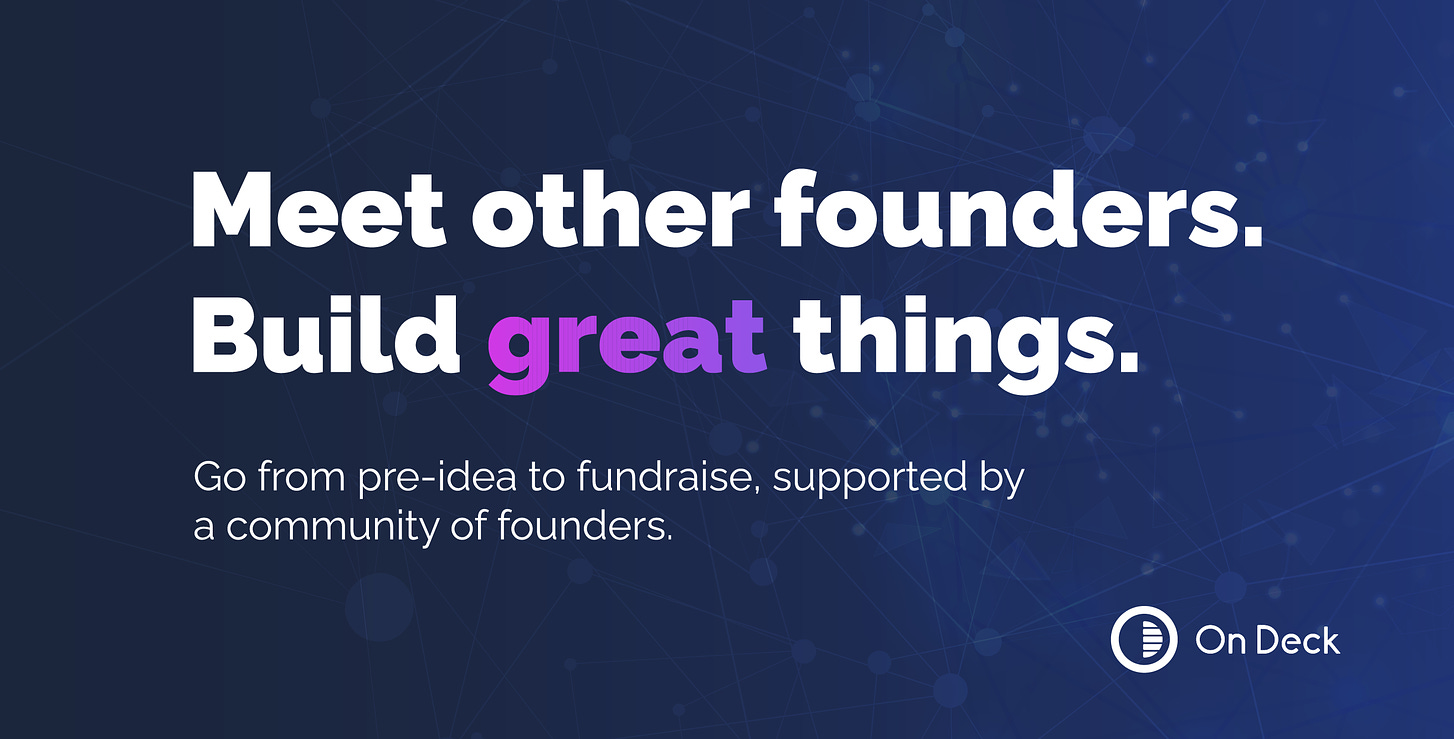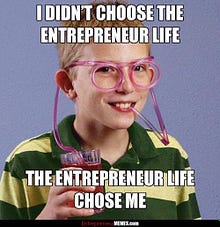Can certain personal traits make you more likely to succeed in entrepreneurship?
Supporting ambitious, entrepreneurial professionals to decide and plan what’s next. Can certain personal traits make you more likely to succeed in entrepreneurship?A low down of the seven top traits I've observed in successful entrepreneurs.In 2018 I started a project that would change my life. As ‘Head of Entrepreneurial Talent’ at a London-based startup accelerator, I was tasked with finding and selecting 20 new entrepreneurs who would be guided to build new businesses from scratch in just three months. They didn’t need an idea, just the raw talent and willingness to build. Our team would provide them with mentorship, WeWork workspace, and guidance for choosing a co-founder within the cohort. At the end of this period, if successful, their new businesses would receive funding. This is a very familiar concept today and numerous company-building programmes exist (including our incredible sponsor for today’s post On Deck 🥳) but at the time this concept was relatively nascent. For a large part, I had to figure out the steps as I went with a huge deal of trial, and error, and I’m sure there was blood, sweat and tears. Here’s how I spent the following 18 months:
We went from having zero recognition in this space to building enough momentum with prospective entrepreneurs, that within one year I interviewed 700 prospective founders (yes you heard that right!) to find the best twenty. Much like running your own company will do to you, this project served as a huge catalyst for my own personal and professional development. My neck was on the line if it didn’t work out, and in the process of bringing the project to life, I had to wear all of the hats (strategy, ops, marketing, hiring, interviewing, candidate management, automation, budget management… you name it). It set me up well for a life of running my own business the next year. Today, I wanted to give you an inside scoop into the characteristics and traits I looked for in the chosen 20 entrepreneurs, as well as the themes I’ve seen coaching people in entrepreneurial careers in the years since. If being your own boss is of interest to you, here are seven traits worth knowing about and how you can use them to increase success in your chosen path, too. First, a quick word from our Sponsor for today’s post, On Deck, who offer a world-renowned company building programme.Meet great founders. Build great things.On Deck Founders (ODF) is an invite-only community for early-stage founders who want to find a co-founder, validate an idea, or build traction towards a fundraise. The best reason to join ODF is to 10x your support network of other helpful founders. ODF founders have gone on to build 1,000+ companies valued over $9 Billion. Some examples include Levels, Secureframe and Pave. Here's what Vance Roush, co-founder of Overflow (who raised a $10M Series A from R7 Partners) had to say
Limited spots available for the next cohort kicking off in early January. The seven traits of successful entrepreneurs1. They maintain strong self-belief (even & especially when things get hard)Being your own boss and turning your ideas into income is no mean feat. You’ll get faced with set backs, rejection and inconsistent income… all in the hope that one day you’ll reap the rewards. But for many people this ‘one day’ takes very a long time to come or never comes at all. When the going gets tough, a tough mindset is the only hope of staying in business. An entrepreneur from that initial cohort is still running his business four years on, and has survived multiple cofounder changes, funding that never materialised, a pandemic that put his industry on hold… but still goes on. Maintaining self-belief creates the possibility for change and a brighter future where your goals are achieved. Strong self-belief ensures that you learn from every set back and come back stronger, not defeated. Many of my clients and myself too, have had big set backs this year. For the year long group programme I’ve been running, many of their January goals never fully materialised. However, they maintain conviction and know this is all par for the course of the entrepreneurial career path. 2. They are organised, on top of the detail and productiveIf you ask my friend Mercurius what he will be doing tomorrow at 4pm, he’ll be able to tell you. He’s no stranger to running a company and spends his days solving hard problems, which take real perseverance and discipline to tackle. In the process of building a company he’s maintained a tight ship from an organisational perspective. He values his time and that means staying true to the calendar. If I want to give him a call, we’ll always schedule it ahead of time. But when I’m on the call, his undivided attention is given. Mercurius is a man on a mission and maintains a rigorous approach to his life and business management, to make his chances of achieving that mission as likely as possible. In coaching sessions I always leave clients with the ‘Next Steps’ written in their coaching workspace. The idea is that when we meet again, usually in two weeks, these next steps should be completed. If they are not, the progress and momentum for all coaching goals gets delayed. No one is perfect and it is rare to get 100% done every time but for those who stay on top, I am amazed by how much progress is achieved week on week. 3. They remain accountable to themselvesAnother discipline-related trait. Many people are good at being accountable to others; as social animals we are hard wired to avoid feeling shame or being seen as incompetent, so we try to keep our word. However, the most successful entrepreneurs also learn to be accountable to themselves. They recognise that for all the accountability systems in the world, there is no substitute for just relying on yourself to get it done in the first place, time and time again. My advice if this is something you struggle with (as many do) would be to accept the support of accountability systems to begin with so that you can create the habit of doing what you say you’ll do. Over time you can work towards better building this muscle yourself. Stay tuned if this is you, I have something coming up. A current client, let’s call her Sally, has been building internal deadlines into her entrepreneurial projects for months and is quick to notice when she falls behind. Our coaching is focused on creating clarity about the next steps (in which order of events) but she is the one creating personal accountability. 4. They focus on their strengthsThere is no shortage of information about building a company out there. Much of this information can appear prescriptive or one-size-fits all. I have a particular disdain for ‘coaches’ who teach others their methods via MLM style programmes. Many students will never achieve the same success. Their Coach happened to be at the right place and the right time to achieve such results, which may never again be replicable. So whilst building funnels with Facebook ads, achieving virality on Twitter threads, or drop-shipping knock-off goods might not achieve the success you crave… one reliable method is focusing on your strengths. Cultivate the self-knowledge to know what kind of business, and business tactics, will put you into a position of most leverage. Every decision; from your strategy, marketing and sales plan, to how to build your team, becomes clearer when you start with self-awareness. I worked with a client who wanted to start his next venture but was undecided on what that would be. He noted the success of podcasters and creators, and was curious. My coaching programme begins analysing strengths, talent, temperament, life vision and goals. These results revealed how much of his strengths lay in large scale, complex projects with moving pieces. He ended up buying a healthcare practice with existing staff, to turn it around and achieve unprecedented levels of profitability. 5. They maintain focus on their visionPart of what makes someone pursue the life of the entrepreneur, is their initial vision. I had a vision for The Ask® back in 2015. I knew I wanted to one day run a content and coaching business to help people find the right work for them. This vision didn’t come out of nowhere or by divine intervention but from real world experiences. Having this imprint in my brain for so long guides me to make strategic decisions when the path forward is unclear. It enables me to say no to certain projects or initiatives (even if they might be more lucrative) and yes to the ones that align. Of course I still make mistakes but the vision is what keeps me on track. For the entrepreneurs who do well, they too will tell you about their vision. I’ve worked with people building financial education for founders, PR & comms for underrepresented businesses, a 1-person media empire, femtech products… whatever the niche there is always a founder at the centre who sees a particular future they are creating. Entrepreneurs lose their way when they forget their vision, or lack any vision at all. When they follow the next shiny new business idea, trend or copy their competitor they quickly fall behind. This is the comparison trap that will eat you up and spit you out if you’re not careful. For earlier stage entrepreneurs its the death by taking 1,000 courses, reading books or paying gurus rather than taking true action towards the important things that got you into business in the first place. Stay focused. It’s not always easy to and might come with sacrifices, but focusing on your vision is a solid investment in the future of your business. 6. They use and apply their real-world expertiseMany new startup founders get into business and act like it is their first day on the job. Everything is new: new software, new branding, new colleagues (if any), new ideas, and goodbye to the shackles of the former life they have left behind! It’s an incredible feeling starting that first business, and it is a one-time only thing. So treasure it. But don’t make the mistake many people do of forgetting about the wealth of knowledge, contacts and expertise they already have. Many people assume their clients will be strangers on the internet they don’t know yet, or that they will have to take lots of new training to be ‘ready’ for their new business. The most successful entrepreneurs use their previous expertise as fuel to grow faster and leverage whatever assets they can. Previous colleagues or contacts become their first clients, deals are struck with vendors they’ve bought from before, former bosses become mentors, or they freelance in a skill they already have to bring extra income to fund their new venture. Build your business around whatever assets you already bring to the table. A client, let’s call her Tina, had a media background before her startup. The number of press features she’s had since, I don’t think is a coincidence. A client who had vast industry experience in software has built a product that addresses the gaps she found working there. Another, I had to coach to accept that her previous work experience is exactly what qualified her to take up a bigger stage with her new business. Even if her startup was still an underdog, she had ten years in related fields that more than qualified her to pitch for funding and press opportunities. 7. They see accepting help as a strength and not a weaknessPhew, we are almost there. As you can see, there is a lot you need to adapt to, learn about, or embody when it comes to being a successful entrepreneur. Another mistake you want to avoid though, is thinking you have to do it all alone. The most successful entrepreneurs have a solid support network: their partner, family, team, coach, therapist, business bestie, communities… you name it. The ‘self-made’ trope is a myth, it takes a village to build a business. What the best entrepreneurs do is willingly acknowledge and look for their blind spots. They don’t let their ego get in the way and think that accepting help makes them some sort of failure. Top world class athletes work with sports coaches because they know that without an objective sparring partner, they will never reach their potential. Coaching works in a similar way — it forces you to acknowledge where gaps lie (eg confidence, discipline, focus, accountability) and build a plan to close that gap. A coach shows up for you week after week to work on closing that gap as fast as possible, and making the journey less lonely. There’s only so much your busy family or partner can provide you with. They may lack the time, energy, or knowledge. Or perhaps have a biased perspective. When I work with clients 1-1 (I coach ambitious, entrepreneurial professionals deciding and planning their next career pivot or business idea) it is all about fine-tuning the areas of your psyche, performance or planning that might be holding you back. Coaching shines a mirror to these things and then we build a bespoke plan with goals, for you to improve upon them. In sessions you can expect to laugh, to cry, and to get sh*t done. I have 4 new spaces opening in January 2023 and am taking bookings now. Fill in a short application form to schedule a no-obligation chat. I can’t wait to meet you. Thanks for reading as always.Happy planning and I’ll be back in your inboxes in two weeks’ time for a wrap up of 2023! Ellen Donnelly, Founder + Chief Coach, The Ask. Sharing is caring! If you like this post from The Ask Newsletter give it some virtual love! |
Older messages
How to plan your year ahead (through career uncertainty)
Wednesday, November 30, 2022
While entrepreneurial professionals are no strangers to uncertainty, the outlook for 2023 brings even more question marks. Plus a bonus guide to planning your year ahead.
Can you have more than one professional identity?
Wednesday, November 16, 2022
Exploring the third option in the 'Generalist' v 'Specialist' debate: The Hybrid professional. An interview with Dr Sarabeth Berk. Part 2 of 2.
Is it better to be a Generalist or Specialist in your Career?
Wednesday, November 2, 2022
Exploring the swathes of research and advice on the topic in a bid to get to the bottom of a long-held debate. Part 1 of 2.
How to commit and follow through on your career and business goals (continued)
Wednesday, October 19, 2022
Overcoming the focus and execution challenges that sit between you and your biggest goals. Part 2 of a 2-part series.
How to commit and follow through on your career and business goals
Wednesday, October 5, 2022
An essay on finding the necessary conviction to pursue what you SAY you most want in your career and relentlessly execute upon it. Part 1 of a 2 part series.
You Might Also Like
$164,449 In 15 Days (His side-income SECRET)
Tuesday, March 18, 2025
5-step action-plan to build a brand-new "side-income" View in browser ClickBank Hi there, This Friday (21st March) a top ClickBank client is running an online Strategy Lab where he'll
Canadian Ecom Seller? A New Course Just for You
Tuesday, March 18, 2025
How independent agencies are staying ahead of the curve
Tuesday, March 18, 2025
Elevating growth amid surging demand for digital media
It's time to bet on emerging platforms
Tuesday, March 18, 2025
Tips to keep your brand adaptable and embrace change ͏ ͏ ͏ ͏ ͏ ͏ ͏ ͏ ͏ ͏ ͏ ͏ ͏ ͏ ͏ ͏ ͏ ͏ ͏ ͏ ͏ ͏ ͏ ͏ ͏ ͏ ͏ ͏ ͏ ͏ ͏ ͏ ͏ ͏ ͏ ͏ ͏ ͏ ͏ ͏ ͏ ͏ ͏ ͏ ͏ ͏ ͏ ͏ ͏ ͏ ͏ ͏ ͏ ͏ ͏ ͏ ͏ ͏ ͏ ͏ ͏ ͏ ͏ ͏ ͏ ͏ ͏ ͏ ͏ ͏ ͏ ͏ ͏ ͏
Elon vs. Sora
Tuesday, March 18, 2025
Google's Veo 2 is in the race too!
The secret to CTAs that convert
Tuesday, March 18, 2025
Your call-to-action (CTA) is the final push that turns visitors into customers. But if it's weak, unclear, or generic, you're leaving money on the table. The best CTAs don't just say “Buy
ET: March 18th 2025
Tuesday, March 18, 2025
Exploding Topics Logo Presented by: Exploding Topics Pro Logo Here's this week's list of rapidly trending topics, insights and analysis. Topic #1 A Pup Above (trends) Chart A Pup Above is a
Newsletters are Dying... But Yours Doesn’t Have To.
Tuesday, March 18, 2025
The 5-Minute Hack to Save Your Dying Newsletter.
31% of All VC Money Last Year Went Into Just 20 Deals
Tuesday, March 18, 2025
Lots of venture capital is going to the same names To view this email as a web page, click here saastr daily newsletter Redpoint: 31% of All VC Money Last Year Went Into Just 20 Deals By Jason Lemkin
Bay Area's AI funding bonanza—or waste?
Tuesday, March 18, 2025
HR tech lawsuit alleges spy scheme; healthtech VC inches toward recovery; Alphabet back in talks for cyberscurity specialist Wiz Read online | Don't want to receive these emails? Manage your






